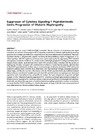Please use this identifier to cite or link to this item:
https://accedacris.ulpgc.es/jspui/handle/10553/74888
| Title: | Suppressor of Cytokine Signaling-1 Peptidomimetic Limits Progression of Diabetic Nephropathy | Authors: | Recio Cruz, Carlota Pilar Lazaro, Iolanda Oguiza, Ainhoa López-Sanz, Laura Bernal, Susana Blanco, Julia Egido, Jesus Gómez-Guerrero, Carmen |
UNESCO Clasification: | 320502 Endocrinología | Keywords: | Chronic inflammation Diabetic nephropathy Fibrosis Macrophages Transcription factors, et al |
Issue Date: | 2017 | Journal: | Journal of the American Society of Nephrology : JASN | Abstract: | Diabetes is the main cause of CKD and ESRD worldwide. Chronic activation of Janus kinase and signal transducer and activator of transcription (STAT) signaling contributes to diabetic nephropathy by inducing genes involved in leukocyte infiltration, cell proliferation, and extracellular matrix accumulation. This study examined whether a cell-permeable peptide mimicking the kinase-inhibitory region of suppressor of cytokine signaling-1 (SOCS1) regulatory protein protects against nephropathy by suppressing STAT-mediated cell responses to diabetic conditions. In a mouse model combining hyperglycemia and hypercholesterolemia (streptozotocin diabetic, apoE-deficient mice), renal STAT activation status correlated with the severity of nephropathy. Notably, compared with administration of vehicle or mutant inactive peptide, administration of the SOCS1 peptidomimetic at either early or advanced stages of diabetes ameliorated STAT activity and resulted in reduced serum creatinine level, albuminuria, and renal histologic changes (mesangial expansion, tubular injury, and fibrosis) over time. Mice treated with the SOCS1 peptidomimetic also exhibited reduced kidney leukocyte recruitment (T lymphocytes and classic M1 proinflammatory macrophages) and decreased expression levels of proinflammatory and profibrotic markers that were independent of glycemic and lipid changes. In vitro, internalized peptide suppressed STAT activation and target gene expression induced by inflammatory and hyperglycemic conditions, reduced migration and proliferation in mesangial and tubuloepithelial cells, and altered the expression of cytokine-induced macrophage polarization markers. In conclusion, our study identifies SOCS1 mimicking as a feasible therapeutic strategy to halt the onset and progression of renal inflammation and fibrosis in diabetic kidney disease. | URI: | https://accedacris.ulpgc.es/handle/10553/74888 | ISSN: | 1046-6673 | DOI: | 10.1681/ASN.2016020237 | Source: | Journal of the American Society of Nephrology : JASN [ISSN 1046-6673], v. 28 (2), p. 575-585 |
| Appears in Collections: | Artículos |
WEB OF SCIENCETM
Citations
50
checked on Feb 8, 2026
Page view(s)
58
checked on Jan 10, 2026
Download(s)
50
checked on Jan 10, 2026
Google ScholarTM
Check
Altmetric
Share
Export metadata
Items in accedaCRIS are protected by copyright, with all rights reserved, unless otherwise indicated.
